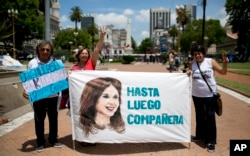Thousands of Argentines demonstrated in the center of Buenos Aires on Wednesday in support of outgoing President Cristina Fernandez and her leftist policies, underscoring the resistance her conservative successor will face to his plans for change.
Fernandez, a fiery and divisive leader, has made it clear she would not make Thursday's handover to president-elect Mauricio Macri easy, even arguing over where the swearing-in ceremony should take place.
Government officials said she has decided to skip it altogether, whether it takes place in La Casa Rosada presidential palace as requested by Macri or in Congress, which is preferred by Fernandez. Her Front for Victory party holds the most seats in the legislature.
Macri's victory in a run-off last month turned Argentine politics on its head, ending 12 years of leftist populism under Fernandez and her late husband and predecessor, Nestor Kirchner.
Macri promises to remove state controls on the ailing economy and conduct more orthodox policies.
Challenges ahead for Macri
Sea of Kirchneristas, as followers of Nestor and Cristina are known, carried colorful banners to the mass gathering at Plaza de Mayo, in front of La Casa Rosada.
One person held aloft a heart-shaped cardboard cutout saying: "Thank you for 12 years of equality, egalitarianism, inclusion and sovereignty."
Martin Sosa, an 18-year-old student, got there in time to claim a prime spot at the demonstration.
"I am grateful to this government because it gave us back our dignity by helping the poor and including us in politics. It gave us work, opened factories, improved access to public education and health care," Sosa said.
"Before, we couldn't dream of studying at university. Now we can," he added. "I am worried Macri will undo all that."
Macri would struggle to reel in unsustainable state spending without bringing Argentines onto the streets, analysts said. He would be only the third non-Peronist leader since the end of a military dictatorship in 1983.
The other two were unable to finish their terms, highlighting how tricky it can be to bring about change without the backing of Peronism, the political movement that has dominated Argentine politics for 70 years.
That said, change is inevitable, according to private economists. Foreign reserves in Latin America's third-largest economy are running precariously low, capital controls have stunted investment and inflation is around 25 percent.






